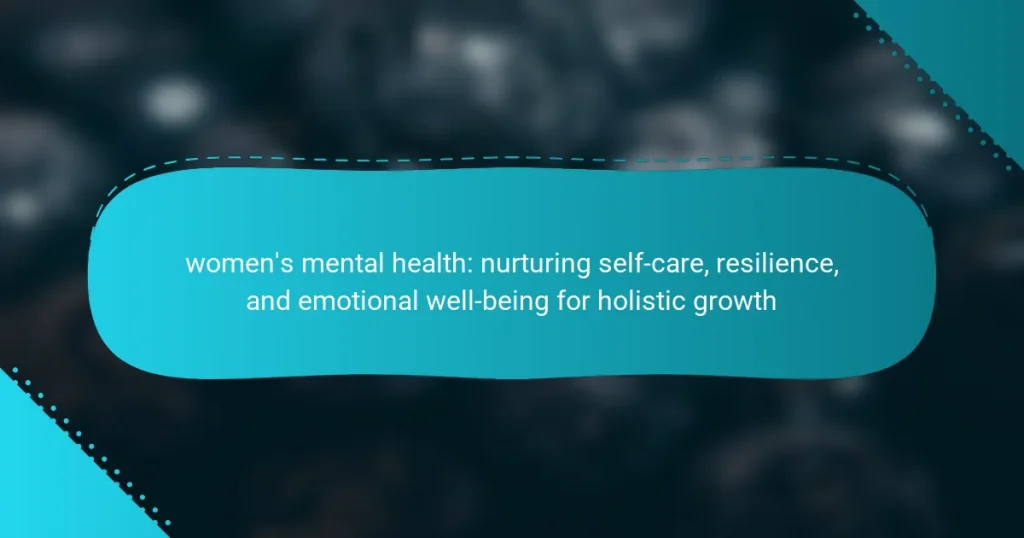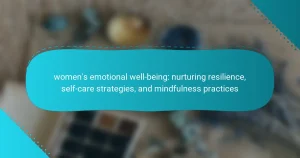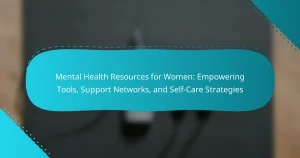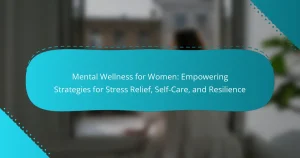Women’s mental health is crucial for enhancing quality of life and fostering holistic growth. This article explores self-care practices that promote emotional stability, strategies to build resilience in the face of unique challenges, and the importance of emotional well-being in decision-making and relationships. It also addresses societal pressures affecting women’s mental health and offers tailored approaches for nurturing these essential components. Prioritising these aspects can lead to improved mental wellness and personal development.
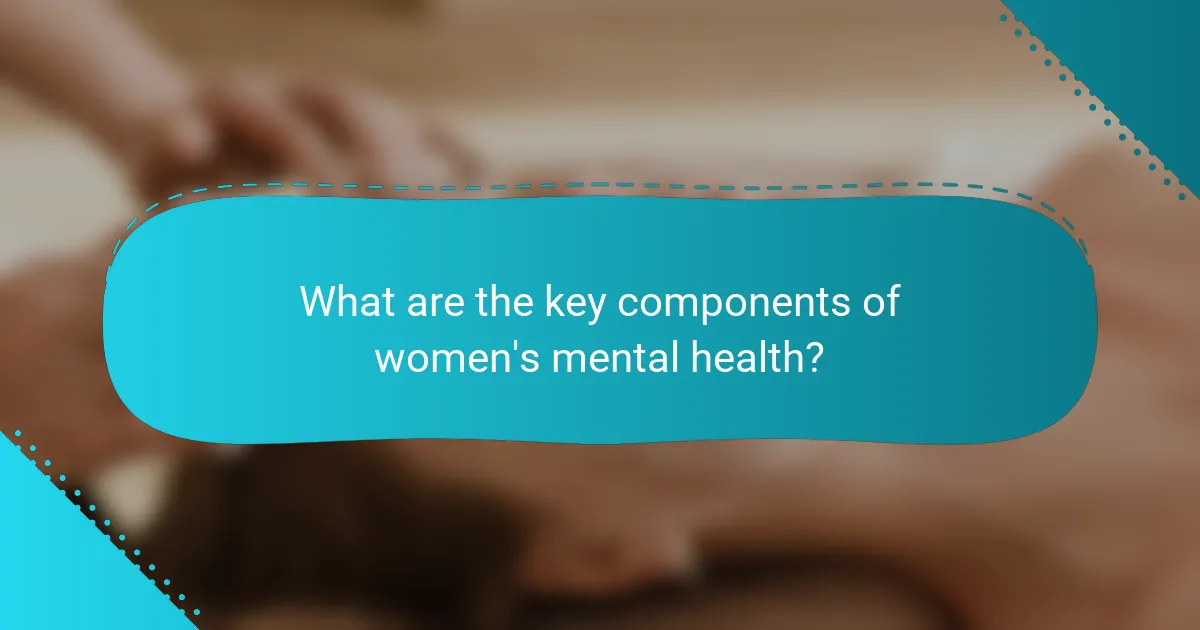
What are the key components of women’s mental health?
Women’s mental health encompasses essential components like self-care, resilience, and emotional well-being. These elements foster holistic growth and enhance overall quality of life.
Self-care includes practices that promote mental clarity and emotional stability, such as mindfulness, exercise, and healthy relationships. Resilience enables women to cope with challenges effectively, contributing to a positive outlook. Emotional well-being involves understanding and managing emotions, leading to better decision-making and interpersonal connections.
Research indicates that women often face unique stressors, including societal pressures and caregiving responsibilities, which can impact mental health. Addressing these components is vital for nurturing a supportive environment that encourages mental wellness and personal development.
How does self-care impact emotional well-being?
Self-care significantly enhances emotional well-being by fostering resilience and reducing stress. Engaging in self-care practices, such as mindfulness, exercise, and adequate rest, allows women to manage their emotions effectively. Research indicates that consistent self-care leads to improved mood and lower anxiety levels. Additionally, prioritising self-care promotes a sense of control and empowerment, essential for holistic growth. By nurturing self-care routines, women can cultivate emotional stability and resilience, contributing positively to their overall mental health.
What role does resilience play in mental health?
Resilience significantly enhances women’s mental health by fostering emotional strength and coping mechanisms. It allows women to navigate challenges and stressors, leading to improved well-being. Research indicates that resilient women experience lower rates of anxiety and depression, promoting holistic growth. Building resilience through self-care practices, such as mindfulness and social support, empowers women to maintain emotional balance and enhance overall mental health.
Why is emotional well-being essential for holistic growth?
Emotional well-being is crucial for holistic growth as it fosters resilience and self-care among women. Prioritising emotional health enhances coping mechanisms, leading to improved mental clarity and decision-making. Research shows that women who engage in self-care practices report higher levels of life satisfaction. Moreover, emotional well-being contributes to stronger relationships and better stress management, essential for overall growth. By nurturing emotional health, women can achieve a balanced and fulfilling life, facilitating personal and professional development.
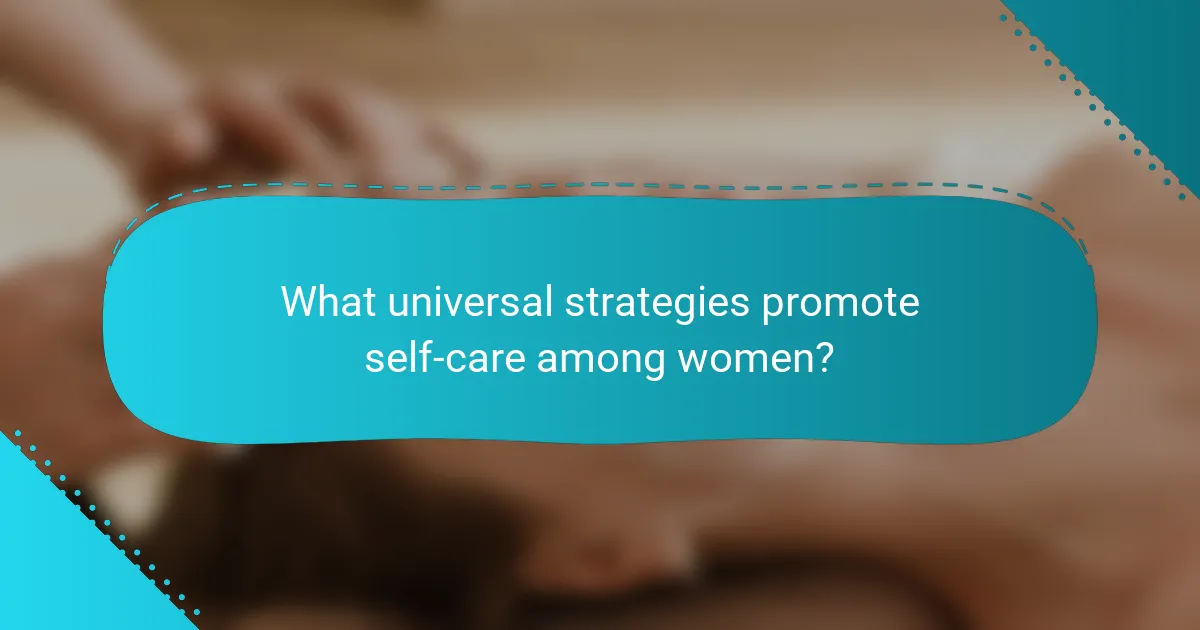
What universal strategies promote self-care among women?
Promoting self-care among women involves strategies that enhance mental health and emotional well-being. Key approaches include establishing routines, practicing mindfulness, and fostering community connections.
Regular self-care routines, such as exercise and healthy eating, significantly improve resilience and emotional stability. Mindfulness practices, like meditation, reduce stress and increase self-awareness. Engaging with supportive communities provides social connections that are vital for mental wellness.
Women can benefit from unique self-care strategies tailored to their needs, such as journaling for emotional expression or creative outlets for stress relief. Prioritising self-care leads to holistic growth and improved quality of life.
How can daily routines enhance mental wellness?
Daily routines can significantly enhance women’s mental wellness by providing structure and promoting self-care. Engaging in consistent activities fosters resilience and emotional stability. For instance, morning rituals like meditation or exercise can reduce stress and improve mood. Establishing a regular sleep schedule also supports cognitive function and emotional regulation. Additionally, incorporating social interactions into daily routines can strengthen support networks, crucial for holistic growth. Prioritising self-care practices within these routines leads to improved mental health outcomes for women.
What are effective stress management techniques?
Effective stress management techniques include mindfulness, physical activity, social support, and time management. These approaches enhance women’s mental health by promoting resilience and emotional well-being. Mindfulness practices, such as meditation and deep breathing, reduce anxiety and improve focus. Regular physical activity boosts mood and energy levels, while social support fosters connections that alleviate stress. Lastly, effective time management helps prioritise tasks, reducing overwhelm and enhancing overall life satisfaction.
How do social connections influence mental health?
Social connections significantly enhance women’s mental health by fostering resilience and emotional well-being. Strong relationships provide support, reduce stress, and promote a sense of belonging. Engaging with friends and family helps women navigate challenges, leading to improved self-care practices. Research indicates that social interactions can lower anxiety and depression levels, contributing to holistic growth. Prioritising these connections is essential for nurturing mental wellness in women.

What unique challenges do women face in mental health?
Women face unique challenges in mental health, including societal expectations, stigma, and access to care. These factors contribute to higher rates of anxiety and depression among women. Societal pressures often dictate women’s roles, leading to stress and emotional strain. Stigma surrounding mental health can prevent women from seeking help. Access to mental health services may also be limited due to financial constraints or lack of resources. Addressing these challenges requires focused strategies that promote resilience and self-care, essential for holistic growth.
How do hormonal changes affect emotional stability?
Hormonal changes significantly impact women’s emotional stability, often leading to fluctuations in mood and resilience. These changes can occur during menstrual cycles, pregnancy, and menopause. For instance, estrogen and progesterone levels influence neurotransmitters that regulate mood, potentially causing anxiety or depression. As a result, self-care practices, such as mindfulness and physical activity, can help mitigate these effects and promote emotional well-being. Understanding these hormonal influences empowers women to nurture resilience and enhance their mental health.
What are the impacts of societal expectations on women’s mental health?
Societal expectations significantly impact women’s mental health by fostering stress and anxiety. These pressures often stem from traditional roles and unrealistic standards of success, beauty, and behaviour. As a result, women may experience diminished self-esteem and increased feelings of inadequacy. A unique attribute of this phenomenon is the societal pressure to maintain a perfect balance between career and family, which can lead to burnout. Research indicates that women are more likely to internalise these expectations, leading to higher rates of depression and anxiety disorders compared to men. Nurturing self-care practices and resilience can mitigate these effects, promoting emotional well-being and holistic growth.
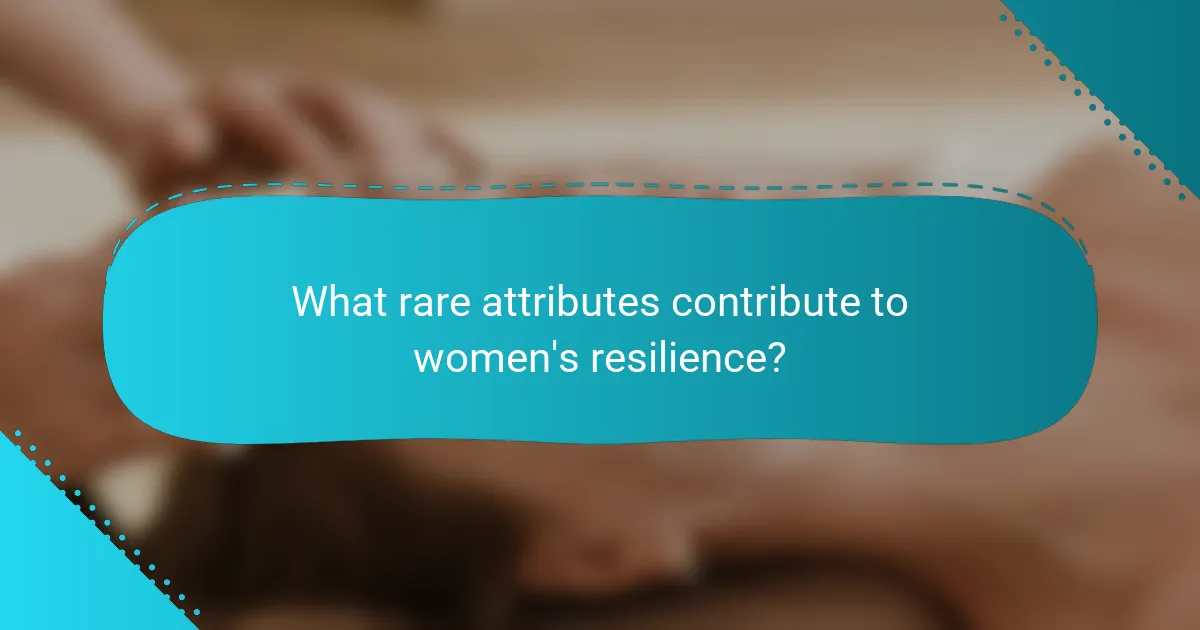
What rare attributes contribute to women’s resilience?
Women’s resilience is enhanced by rare attributes such as adaptability, emotional intelligence, and community-building skills. These qualities enable women to navigate challenges effectively. Adaptability allows women to adjust to changing circumstances, fostering resilience in the face of adversity. Emotional intelligence contributes to understanding and managing emotions, which strengthens coping mechanisms. Community-building skills create supportive networks that provide encouragement and resources, further enhancing resilience.
How does trauma history shape coping mechanisms?
Trauma history significantly influences women’s coping mechanisms, often leading to unique responses to stress. Women with trauma backgrounds may develop resilience through adaptive strategies like seeking social support or engaging in self-care practices. Conversely, some may resort to maladaptive coping, such as avoidance or substance use, which can hinder emotional well-being. Understanding these patterns fosters holistic growth by promoting tailored interventions that nurture resilience and enhance mental health.
What role does creativity play in emotional expression?
Creativity enhances emotional expression by providing women with tools to articulate feelings and experiences. Engaging in creative activities fosters resilience and promotes mental health. Studies show that artistic expression can reduce anxiety and improve emotional well-being. Furthermore, creativity serves as a unique attribute in self-care practices, allowing for personal growth and holistic development. By nurturing creativity, women can cultivate a deeper understanding of their emotions and enhance their overall mental health.
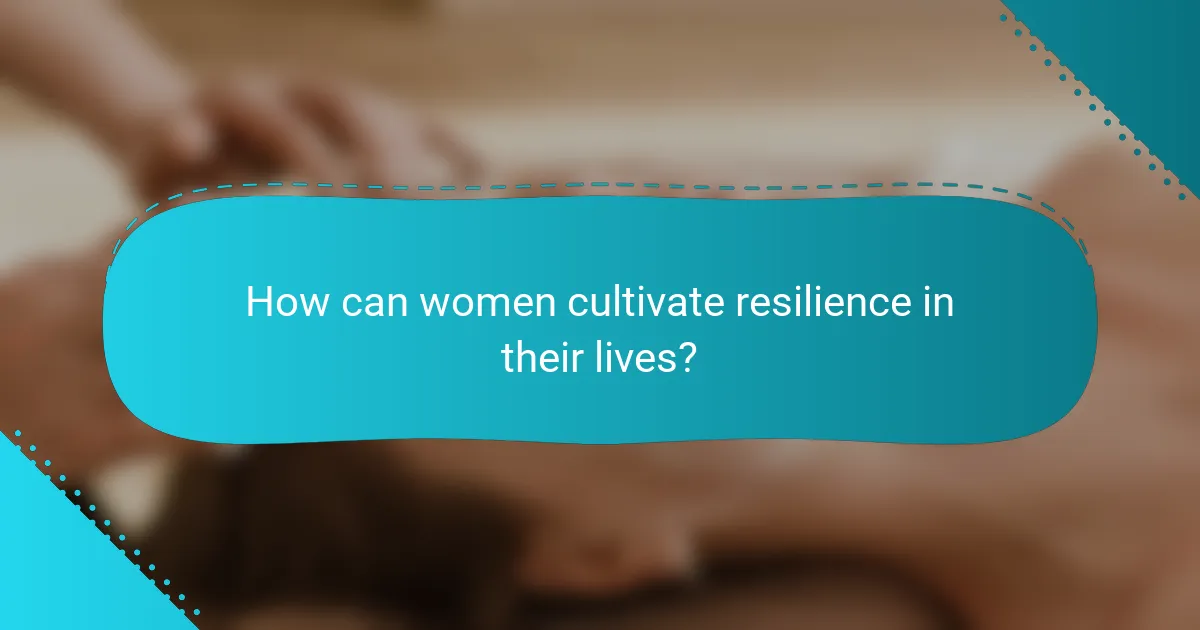
How can women cultivate resilience in their lives?
Women can cultivate resilience by prioritising self-care, building supportive relationships, and practicing mindfulness. Engaging in regular physical activity enhances mental well-being, while establishing a strong social network provides emotional support. Mindfulness practices, such as meditation, improve emotional regulation and stress management. Additionally, setting achievable goals fosters a sense of accomplishment and purpose, reinforcing resilience. Research indicates that women who actively nurture these attributes experience improved emotional well-being and greater adaptability in facing life’s challenges.
What practical steps can enhance emotional well-being?
To enhance emotional well-being, women can adopt practical self-care strategies. Prioritising regular physical activity boosts mood and reduces stress. Mindfulness practices, such as meditation, foster resilience and emotional balance. Establishing strong social connections provides essential support. Engaging in creative activities promotes self-expression and joy. Setting boundaries helps manage stress and maintain mental clarity. Regularly reflecting on personal achievements nurtures self-esteem and a positive mindset.
What common mistakes should women avoid in self-care?
Women should avoid neglecting their mental health needs, overcommitting to obligations, and dismissing the importance of boundaries. Prioritising self-care is essential for resilience and emotional well-being. Common mistakes include ignoring signs of burnout, failing to practice mindfulness, and not seeking support from others. Emphasising self-compassion and realistic expectations can enhance holistic growth.
How to set realistic self-care goals?
Setting realistic self-care goals involves identifying specific, achievable actions that enhance women’s mental health. Start by assessing current needs and challenges.
1. Define clear objectives, such as practicing mindfulness or engaging in physical activity.
2. Break goals into manageable steps to avoid overwhelm.
3. Set a timeline to track progress, ensuring flexibility for adjustments.
4. Celebrate small victories to build resilience and maintain motivation.
This approach fosters emotional well-being and supports holistic growth.
What are the signs of burnout to watch for?
Signs of burnout include chronic fatigue, irritability, reduced performance, and feelings of detachment. Women may experience unique symptoms such as heightened emotional sensitivity and difficulty concentrating. Recognising these signs early can aid in nurturing self-care and emotional well-being. Addressing burnout is essential for holistic growth and resilience in women’s mental health.
What expert insights can help optimize mental wellness?
Expert insights emphasise that nurturing self-care, resilience, and emotional well-being significantly enhance women’s mental health. Prioritising self-care routines, such as mindfulness practices and physical activity, fosters resilience. Research shows that women who engage in regular self-care report higher emotional well-being and lower stress levels. Building a supportive community also plays a critical role in mental wellness, as social connections provide essential emotional support. Additionally, understanding the unique challenges women face, such as work-life balance and societal pressures, allows for tailored strategies that promote holistic growth.
